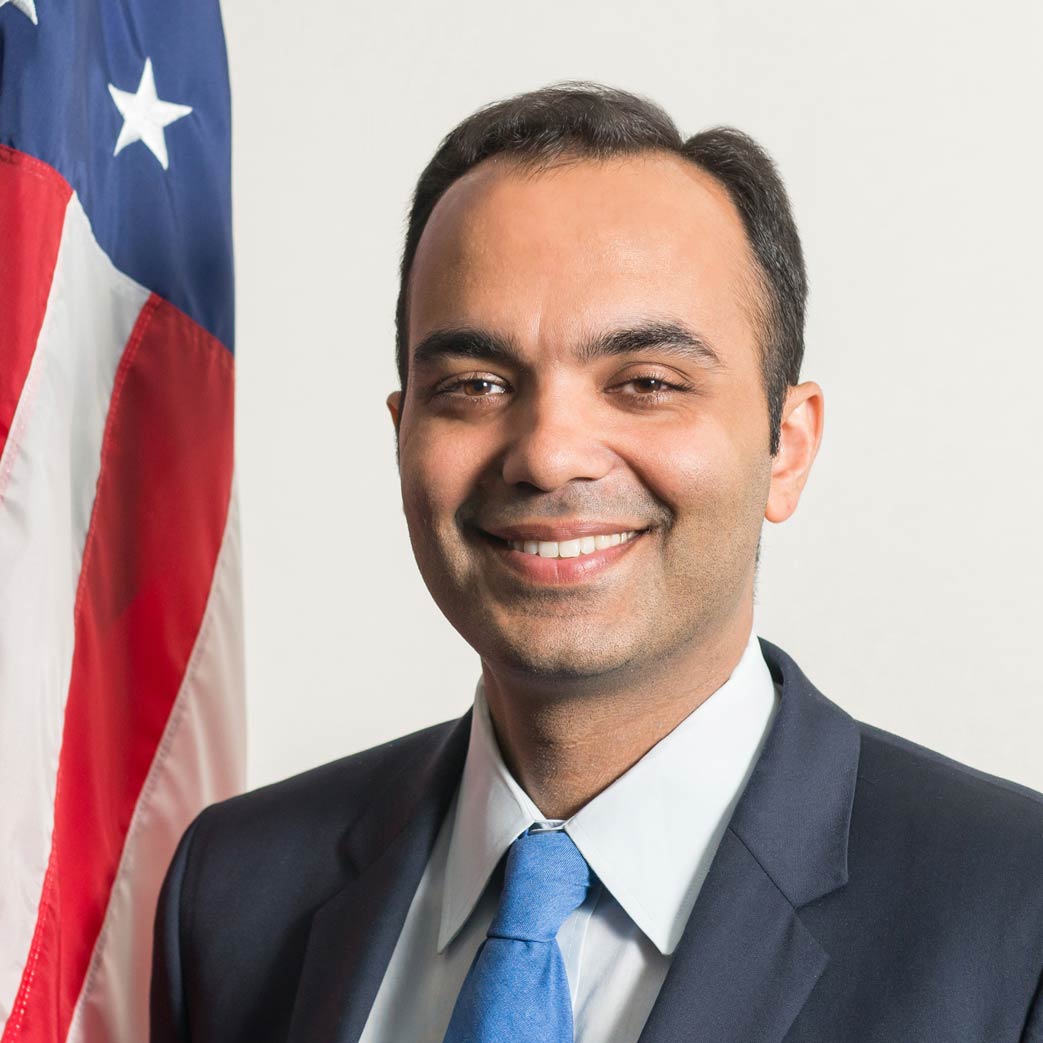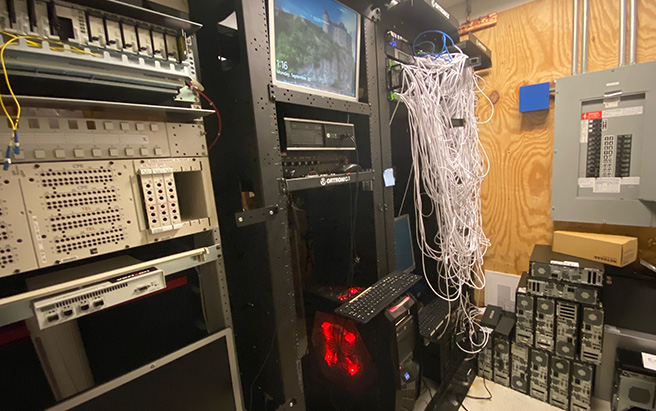MCA Skeptic Rohit Chopra Confirmed by Senate to Head CFPB
October 1, 2021 More than eight months after deBanked announced that FTC Commissioner Rohit Chopra would be the next head of the Consumer Financial Protection Bureau, his appointment has finally been confirmed by the Senate.
More than eight months after deBanked announced that FTC Commissioner Rohit Chopra would be the next head of the Consumer Financial Protection Bureau, his appointment has finally been confirmed by the Senate.
The confirmation of Chopra is notable given the agency’s objectives to collect data from small business finance companies and the fact that Chopra himself has been very vocal about merchant cash advances in particular.
One year ago, in his capacity as an FTC commissioner, he referred to the industry as “opaque” with “pay-day style” products whose structure “may be a sham.”
In an interview with NBC around the same time, he used stronger language, saying that he was “looking for a systemic solution that makes sure they can all be wiped out before they do more damage.”
Chopra knows his way around the CFPB. He worked for the agency when it first started in 2010 and was there for five years as the Assistant Director & Student Loan Ombudsman. He later moved to the FTC as a commissioner and now returns back at the CFPB in the director’s seat.
Would You Invest Your IRA Funds into MCAs?
September 22, 2021 A partnership between Supervest and Alto Solutions will bring in an unprecedented opportunity for investors, as the two groups will come together to allow IRA investors a chance to put their money in MCA funding. Account holders with Alto will be able to divide their money on a fractional basis to a diverse set of investments on the Supervest interface.
A partnership between Supervest and Alto Solutions will bring in an unprecedented opportunity for investors, as the two groups will come together to allow IRA investors a chance to put their money in MCA funding. Account holders with Alto will be able to divide their money on a fractional basis to a diverse set of investments on the Supervest interface.
“We expect these alternative investments to be very popular given the meaningful diversification they can provide to individual retirement portfolios in addition to being yield-generating and short-duration products,” Alto’s Chief Revenue Officer Tara Fung told deBanked on Tuesday. “We will continue adding to our platform so that clients have more options to invest in alternative assets that further diversify and grow their retirement portfolios.”
Alto has made a business model out of using IRA funds for unique alternative investments. Crypto investments are another option listed on their website.
Supervest is no stranger to incorporating new business ideas, either. Their business model is based on connecting investors to inaccessible classes of assets, like MCAs for example.
John Donahue, the Chief Investment Officer with Supervest, spoke with deBanked on Wednesday about the opportunity it gives IRA account holders. “It’s the opportunity for any accredited investor to now be able to access the Supervest platform of fractionalized participation in MCA deals through their self-directed IRA,” Donahue said.
MCAs can be inherently riskier than a typical lukewarm investment portfolio, but the IRA concept is basically detached from the selected risk profile therein.
“The IRA is strictly a structure,” said Donahue, when asked about the inherent risks of MCA investments with IRA money. “It really doesn’t have a connotation of conservative or aggressive nature. You can have aggressive mutual funds [in an IRA], you can have your entire investment of your IRA in the ARK New Technology fund, and while that has gone up considerably in the past few years, there’s a massive amount of volatility, it’s extremely risky, and arguably much riskier than an MCA investment.”
Donahue reiterated that only “accredited investors” would have access to these types of investments through the Supervest platform.
As the partnership between the two companies kicks off, it’ll be interesting to see if individuals are willing to put their retirement money on the line to invest in small businesses.
Miami May Become the New Small Business Funding Hub
September 22, 2021 At least two funding companies have told deBanked off the record that they plan on opening offices in the Miami area in the new year.
At least two funding companies have told deBanked off the record that they plan on opening offices in the Miami area in the new year.
It seems that South Florida, particularly Miami, is where the small business finance industry may be moving for a fresh start, and with that potentially ditching the suit and tie for flip flops and shades in the process. The social, political, and economical elements of South Florida make it a well-suited landing spot for an industry that is looking to evolve with the shifting environment.
One catalyst to the potential industry-wide migration could be the S5470B regulations that go into effect in New York on January 1. The new law will require funding companies to navigate a complex system of disclosure to any interested small business finance prospect.
There are other benefits to Florida, of course.
Jordan Fein, CEO of Greenbox Capital, whose operated his business out of Miami since 2012, prides his choice of locale on all the factors that are seemingly pushing those in New York down south. “We do not have state and city tax, we are near water and have a better lifestyle than most companies in New York, or in other areas where it gets very cold in the winter,” he said.
Fein stressed the relaxing Miami lifestyle as the reason why he has only called South Florida home to his company. “The lifestyle here is second to none. Being near the ocean, it makes it much more enjoyable to be able to go to the beach or on a boat to relax and take a load off from the busy work week. New York and other large cities seem to add more stress from [New York’s] super-fast-paced style.”
Despite his love for Miami, Fein respects New York’s ability to churn out top tier employees in the industry. “The talent pool is still among the best,” Fein said, when asked if there were any reasons he or others would ever consider maintaining a connection with the area should an exodus occur.
Fein isn’t worried about the incoming competition should offices relocate to his area. “Location of a funding company has no bearing on competition,” he said. “We all do business over the internet and the competition of funding is dependent on new companies entering the space, not on their location.”
If it is true that the industry is moving to a fully digital competitive space, the idea of a warm weather city with great tax benefits, comparatively low costs of living, and a low-stress atmosphere may be a no-brainer when it comes to finding the funding industry a much needed new home. Not to mention, the mayor of Miami also really wants small business finance companies to relocate there.
In a taped episode of deBanked TV, Miami Mayor Francis Suarez told reporter Johny Fernandez that he really wants small business lenders and MCA companies to set up shop in his city.
Watch: Miami Mayor Francis Suarez talks with deBanked in March 2021“We definitely want to make sure that small business, merchants, and lenders are able to capitalize small businesses in our community,” he said. “Miami’s a very thriving small business community. One of the things that people have criticized us for is we don’t have those big massive companies. We’re actually really built on small businesses. So for us, having fluidity of capital, liquidity of capital, access to capital are enormous things in terms of scaling. And I think that’s one of the things that we’re seeing change now is because of technologies. We’re getting a tremendous amount of access to capital that we weren’t getting before.”
New York DFS: The Commercial Financing Disclosure Requirement is Happening
September 21, 2021 New York State’s financial regulator announced that the commercial financing disclosure law is moving forward as planned for the Jan 1, 2022 deadline.
New York State’s financial regulator announced that the commercial financing disclosure law is moving forward as planned for the Jan 1, 2022 deadline.
To prepare those that will be subject to it, Acting Superintendent Adrienne A. Harris released a copy of proposed regulations that will be open to comment for 60 days.
Its length, 45 pages, demonstrates the complexity that compliance will require. Anyone involved in commercial or small business financing should take the careful time to read it.
“The Department of Financial Services will then review all received comments and issue a final regulation,” the announcement says.
Homegrown Software Enables FundKite to Reconcile MCAs Daily Rather Than Monthly
September 21, 2021 “Data is the future,” said Alex Shvarts, CEO of FundKite. Through his own proprietary software that he personally built, Shvarts and his team can see daily deposits from merchants that FundKite has funded while also viewing the real-time financial condition of their customers. There are no assumptions, no end-of-month scrambling to do MCA reconciliations, and there are significantly less defaults, he says.
“Data is the future,” said Alex Shvarts, CEO of FundKite. Through his own proprietary software that he personally built, Shvarts and his team can see daily deposits from merchants that FundKite has funded while also viewing the real-time financial condition of their customers. There are no assumptions, no end-of-month scrambling to do MCA reconciliations, and there are significantly less defaults, he says.
Shvarts believes that he has a better chance of retaining clients and keeping deals in place when customers face difficulties. “When merchants are in trouble, they are being coached not to pay,” he said, hinting at third parties in the industry that lobby customers to stop payment in exchange for some kind of alleged assistance.
“Our merchants don’t go under,” Shvarts said.
The premise is that FundKite’s tech enables both themselves and the customer to keep track of how much money is going in and out in real time. That allows them to apply the precise holdback on a daily basis instead of waiting for a bank statement at the end of the month to see what the difference was.
“Our goal is to use our software to be extremely merchant friendly,” said Shvarts.
 By compiling different data sets about the merchant, potential clients can be pre-approved and fully funded in less than an hour through a completely digital application process. While this process of instant pre-approval isn’t new to the industry, it’s the idea of having access to client’s banking information that is key to the software’s accuracy and success in funding packages and payment options.
By compiling different data sets about the merchant, potential clients can be pre-approved and fully funded in less than an hour through a completely digital application process. While this process of instant pre-approval isn’t new to the industry, it’s the idea of having access to client’s banking information that is key to the software’s accuracy and success in funding packages and payment options.
The idea of end-of-month reconciliation doesn’t work for many merchants, according to Shvarts, who was speaking in reference to merchant cash advance transactions. “A month later, they could already be in the hole,” he said. “This product [where debits vary daily based upon true sales] works better for merchants, it works better for portfolios, if you’re actually reconciling and pulling what you’re supposed to, and not what you’re anticipating.”
The system is maintained in-house at the firm’s downtown Manhattan offices, with a fully temperature-controlled server room that is home to dozens of computers that host the company’s software. Backed up in the cloud as a failsafe, the system is as much of a presence in the office, both physically and virtually, as the individuals that work there.
“I’ve always had coding implanted in my mind, it’s an everyday process to make things simpler and faster,” he said. Shvarts explained that his love for coding and finance stems from a childhood passion for chess. “Chess taught me the ability to analyze moves.”
Small Business Finance Industry Mulls Crypto, NFTs
September 16, 2021 As the crypto craze roars on, NFTs are starting to stake a claim in the finance world as a legitimate option for those looking to invest or stash money in a virtual space. The sports world recently took their swing at NFTs, and here at deBanked we minted NFTs of our own early this week. It seems that NFTs have sparked the interest of the media, athletes, and art enthusiasts— but in small business finance, the conversation is only in the early stages.
As the crypto craze roars on, NFTs are starting to stake a claim in the finance world as a legitimate option for those looking to invest or stash money in a virtual space. The sports world recently took their swing at NFTs, and here at deBanked we minted NFTs of our own early this week. It seems that NFTs have sparked the interest of the media, athletes, and art enthusiasts— but in small business finance, the conversation is only in the early stages.
“I think of it more not so much as a currency, but from what I’ve been reading, more of an investment vehicle,” said Noah Grayson, President of South End Capital, when asked what he thinks an NFT represents. “It’s a way for people to put tangible items in a digital format to get ownership from.”
Grayson says those in his industry have brought up the topic around the office, but it hasn’t made its way into any type of business practices yet. “It’s tough to see how [NFTs] would affect the lending industry at this time, cryptocurrency is something a little more probable in the long term.”
Grayson stressed how difficult small business lending can already be with dollars, and it seems as though the industry just isn’t ready to start conducting business in other types of currencies. “When you consider that many small business owners have no credit score and a large portion of those still pay for things in cash, I think it’s going to be a long time before the industry as a whole considers [crypto] an option to make loans with or compensate partners [with] as a whole,” he said.
“I’d describe it as a digital asset that can be purchased, owned, and used by an individual, giving that individual exclusive rights to the asset,” said James Webster, CEO and founder of ROK Financial when asked how he would define an NFT. “Like any other asset, the price can go up or down over time.”
Although his company has never created an NFT themselves, Webster won’t eliminate the possibility for one in the future. With the interest of the industry and his employees being focused around crypto as of late, Webster can’t keep the crypto and NFT talk out of the office.
 “We have a [clever] and nimble-minded staff at ROK. NFTs and crypto like other tradable assets are always being discussed and invested in here,” said Webster. “The team has been buying crypto for years now and I don’t see that slowing down any time soon.”
“We have a [clever] and nimble-minded staff at ROK. NFTs and crypto like other tradable assets are always being discussed and invested in here,” said Webster. “The team has been buying crypto for years now and I don’t see that slowing down any time soon.”
Webster believes it’ll inevitably make its way into the business with positive effects. “I see it streamlining, as well as making lending and banking for that matter more efficient over time,” he said.
At Velocity Capital Group, crypto has already seeped into the business. The company began offering commission payments to brokers this past August with an immediate positive reception. Velocity Capital Group CEO Jay Avigdor attributes “speed” as the primary use-case of crypto in his business.
“The feedback has been fantastic!” Avigdor said.
With crypto on the minds of fintech gurus everywhere, it’s evident its interest comes from the ability to put the technology in practice. Until these types of things can be borrowed, used to buy goods, or seen as a means of collateral at a mainstream level, the small business finance community will continue to eye their development and evolve if necessary.
Lenders, Funders Look to Expand as 2021 Heads Into Final Stretch
September 14, 2021 As the year ends, lenders and funders across the globe are looking to meet goals, help businesses, and close the books on some of the most unpredictable months the industry has ever seen. Whether it comes to improving technology, hiring more staff, or creating completely new concepts on how to do business, any company worth its salt isn’t just going to be content with just staying stagnant.
As the year ends, lenders and funders across the globe are looking to meet goals, help businesses, and close the books on some of the most unpredictable months the industry has ever seen. Whether it comes to improving technology, hiring more staff, or creating completely new concepts on how to do business, any company worth its salt isn’t just going to be content with just staying stagnant.
“Our main goal for this year’s end is to scale our small business loan and MCA deal flow in order to maximize our syndication opportunities, which we want to overtake commission as our primary revenue stream,” said Zack Fiddle, President of CapFront. “We’ve already built a robust CRM and marketing automation system over the past year, we have great people and a proven process and product, and we just moved to a much larger space.”
From a brand-new office in Garden City, Fiddle seems to be expanding his company on multiple fronts. “The next step for us is hiring more support staff and more account managers to handle more leads from increased media [spending] and more referrals from our various business development channels,” he said.
Other fintech brands are looking to come up with new ideas surrounding borrowing. “We are coming out with a special lawyer loan,” said Justin Leto, co-founder and CEO of Miami-based Idea Financial, whose recent announcement about LevelEsq will allow the firm to divi out loans to attorneys who wait to get paid until when —or if — their client wins. “We’ll have the only insurance product that is available on the market that will cover the downside risk that the case [the attorney] is borrowing on goes to trial and loses.”
“It’s a really exciting time here at Idea Financial because we are able to leverage a lot of our existing resources and expertise to enter an entirely new market, which is legal lending,” said Larry Bassuk, co-Founder and President of Idea Financial.
Other firms are taking the current political and social climates into consideration when it comes to their end-of-year plans. “[We’ll] be analyzing risk a little more in case there is another lockdown,” said Drew Matthew, CEO of Infusion Capital Group. The two-person firm doesn’t plan to expand their staff too much going into the new year, but Matthew did flirt with the idea of bringing on an ISO-rep as his business expands.
“I think we’re going to pick up dramatically,” said Matthew when asked about the number of his future clients. “Once there’s no more [covid restrictions], SBA money, or no more fear of another pandemic shutdown, no matter what [we charge], the small businesses in America need us.”
This risk and surrounding political climate have no influence on the location of Infusion Capital’s offices in the future. “I know everyone is going down to Florida, but not us,” said Matthew. “New York or nowhere, baby.”
As seasons change and the year ticks its final months, lenders, much like the businesses they support, are looking to find the next best way to edge out competitors while offering the best product and services for their customers.
Brokers Say “Yes” to Commissions in Crypto
September 12, 2021 One month after Velocity Capital Group began offering broker commissions in crypto, CEO Jay Avigdor says it is taking off. It’s completely optional of course, but already seven of VCG’s ISOs have opted to get paid that way.
One month after Velocity Capital Group began offering broker commissions in crypto, CEO Jay Avigdor says it is taking off. It’s completely optional of course, but already seven of VCG’s ISOs have opted to get paid that way.
“The feedback has been fantastic!” Avigdor says.
In a previous interview with deBanked, Avigdor said that the initiative wasn’t about speculating on cryptocurrencies but instead about taking advantage of the transaction speed. Crypto can change hands faster than an ACH or a wire, for example, and VCG will send funds via a stablecoin so that there is no volatile exchange rate risk.
“Our goal since day 1 of VCG, was to give ISOs and merchants the ability to access capital as fast as possible,” Avigdor said. “With VCG’s proprietary technology, we have been able to change that mindset from ‘as fast as possible’ to ‘the FASTEST possible.’”
One broker attested on facebook that he received his commission from VCG within 5 minutes from the moment the deal funded via the DAI stablecoin.
Even a merchant requested that they be funded with crypto, according to Avigdor, which they accommodated. Payments back to VCG are still done via ACH debit, however.
The market cap of the cryptocurrency industry is currently at more than $2 trillion.






























